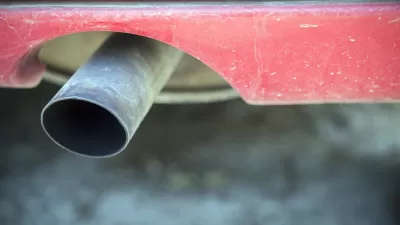California Assemblyman Phil Ting has tried unsuccessfully for the last two years to end the sale of new gas and diesel-powered passenger motor vehicles by 2040. He achieved some success by securing funds in an approved budget bill to study a ban.

"Last year, Assemblyman Phil Ting (D-San Francisco) introduced his Clean Cars 2040 Act, a sweeping bill to require every new passenger car sold in California to be a zero-emission vehicle within a little more than two decades," writes Dustin Gardiner, a state Capitol reporter for the San Francisco Chronicle.
After that bill died, he came back with a more modest proposal this session. AB 40 would have required the state to develop a strategy to get to the 2040 goal, without putting the ban into law.
However, that bill died as well.
“It’s actually embarrassing that California still hasn’t taken action,” Ting said, noting that countries including China, France and Britain have plans to promote the use of electric cars and other vehicles that don’t emit greenhouse gases. “If you want clean air, you need clean cars.”
[Correspondent's note: Jack Ewing, who reported on the French target on July 6, 2017, for The New York Times, acknowledged that it "is less ambitious than ones set by countries like Norway and India."]
"Ting found another route in the state’s new [$215 billion] budget, which lawmakers passed Thursday, thanks to a little-debated $1.5 million appropriation," adds Gardiner. "It helped that Ting was vice chairman of the conference committee that negotiated a budget deal among the Assembly, Senate and Gov. Gavin Newsom."
If Newsom doesn’t blue-pencil the idea out of the spending plan, state Environmental Protection Agency Secretary Jared Blumenfeld will work with state agencies to conduct the study. The budget doesn’t give a deadline for them to issue a report.
Broad-based study
The study, which won't include the 2040 timeframe for the ban, will not be confined to motor vehicle technology but would look at other strategies to "achieve carbon neutrality [pdf] in the [transportation] sector [...] such as changing land-use planning and increasing transit ridership."
That's good because the state won't meet its climate goals even if were to increase electric vehicle sales ten-fold, reported the Los Angeles Times last November. It would still need to reduce vehicle miles traveled per capita by 25 percent.
As to why AB 40 died this year, Gardiner reports that Sierra Club California, which strongly backed the bill, blamed it on Assemblyman Jim Frazier, D-Discovery Bay, who chairs the Transportation Committee. Frazier, in turn, criticized the Sierra Club for "refus[ing] to compromise on a few words of the bill’s language, which he didn’t specify."
Related in Planetizen:
-
Phasing Out the Internal Combustion Engine No Easy Task (Global Climate Action Summit): September 18, 2018
-
Momentum Builds to Ban Sales of Gas and Diesel-Powered Cars in California, November 10, 2017
Hat tip to Jim Stewart.
FULL STORY: California idea to study phasing out gas-powered cars wins new life

Alabama: Trump Terminates Settlements for Black Communities Harmed By Raw Sewage
Trump deemed the landmark civil rights agreement “illegal DEI and environmental justice policy.”

Study: Maui’s Plan to Convert Vacation Rentals to Long-Term Housing Could Cause Nearly $1 Billion Economic Loss
The plan would reduce visitor accommodation by 25% resulting in 1,900 jobs lost.

Why Should We Subsidize Public Transportation?
Many public transit agencies face financial stress due to rising costs, declining fare revenue, and declining subsidies. Transit advocates must provide a strong business case for increasing public transit funding.

Paris Bike Boom Leads to Steep Drop in Air Pollution
The French city’s air quality has improved dramatically in the past 20 years, coinciding with a growth in cycling.

Why Housing Costs More to Build in California Than in Texas
Hard costs like labor and materials combined with ‘soft’ costs such as permitting make building in the San Francisco Bay Area almost three times as costly as in Texas cities.

San Diego County Sees a Rise in Urban Coyotes
San Diego County experiences a rise in urban coyotes, as sightings become prevalent throughout its urban neighbourhoods and surrounding areas.
Urban Design for Planners 1: Software Tools
This six-course series explores essential urban design concepts using open source software and equips planners with the tools they need to participate fully in the urban design process.
Planning for Universal Design
Learn the tools for implementing Universal Design in planning regulations.
Smith Gee Studio
Alamo Area Metropolitan Planning Organization
City of Santa Clarita
Institute for Housing and Urban Development Studies (IHS)
City of Grandview
Harvard GSD Executive Education
Toledo-Lucas County Plan Commissions
Salt Lake City
NYU Wagner Graduate School of Public Service





























